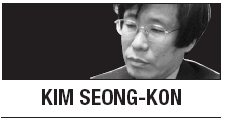With Seoul National University’s recent decision to designate Korean history a required subject for applicants, other universities are beginning to follow suit. There is no need to debate the importance of history education. However, a more essential and urgent question we must ask is how do we want to teach history? It is well known that secondary school history education in Korea today is seriously distorted by radical, pro-North Korea teachers who teach, for example, that the Korean War was a U.S. imperialist war started by South Korea. Completely ignoring historical complexities, they also teach that Rhee Syngman and Yi Kwangsu were nothing but pro-U.S. and pro-Japan politicians, respectively, which is also far from the truth.

Leftist historians have long criticized Yi Kwangsu for driving Korean young men to the warfront by encouraging them to join the Japanese army during the Pacific War. Initially, however, Yi was a stout anti-Japan activist who was arrested by the Japanese police and imprisoned for five months. Why, then, did he decide to collaborate with the Japanese in later years and what did he have to say about his alleged apostasy? These are the types of questions history educators should encourage students to ask.
According to his autobiography, “My Confessions,” Yi had his own compelling reasons for his actions. Yi wrote, “If we sent tens of thousands of young Koreans to the warfront for Japan, the Japanese people could not discriminate against us anymore. Serving in the military or in a munitions factory was compulsory anyway. Furthermore, the industrial and military training the young Koreans gained could greatly benefit Korea when liberated from Japan.”
In his autobiography, Yi writes that if Koreans refused to cooperate, Japan would persecute Korea more ruthlessly and continue to discriminate against Koreans in many areas such as school admissions. Most importantly, Yi disclosed the fact that the Japanese colonial government had made a list of 38,000 anti-Japan Korean intellectuals to be executed under martial law. Yi wrote, “It was wartime and execution was imminent.” In “My Confessions,” therefore, Yi Kwangsu confessed that he volunteered to be a pro-Japan intellectual in order to lift his country from the relentless reality and save the lives of the 38,000 blacklisted compatriots.
After Yi’s speech that encouraged Korean students to enlist in the Japanese army, seven or eight Korean students visited Yi’s residence. The conversations between Yi and the young Korean students were heartbreaking, but illuminating. One of them said, “We’ve decided to enlist, hoping our brothers and sisters will not be discriminated against at school.” Another student said, “If I refused to be drafted, the Japanese will ruin my family. So I decided to enlist.” The third student confessed, “I am joining the Japanese army to learn combat skills which I will need when I fight for the independence of Korea in the future.”
Obviously, Yi’s heart was broken when he heard the confessions of these young men. Yi wrote: “I could have hidden in a small cabin in the countryside and remained silent. That would have been much easier for me and would have kept my honor intact. But I decided to sacrifice myself for my country and people at the risk of my honor and reputation, even though I may end up being criticized as a collaborator of Japan”
Yi constantly lamented the backwardness of his country and people who were hopelessly buried in the past, and unaware of the radical changes taking place in the rapidly modernizing world. Thus, he thought that Korea’s independence could be achieved through the enlightenment of the Korean people, alteration of people’s consciousness, and social reform. When Yi wrote the controversial essay, “Reconstructing the Korean People,” however, a group of young men broke into his house and threatened him with knives and swords, calling him “a national traitor.”
As a father figure of modern Korean literature, Yi Kwangsu took the blame and became a fallen man. Yi has been unjustly targeted in the whirlwind of power politics and ideological skirmishes in Korea for the past few decades. Granted Yi was a pro-Japan intellectual, but who could throw stones at him? As Yi stated, during the Japanese occupation, those who paid taxes, adopted a Japanese name, or sent their children to public schools were pro-Japan in a strict sense. In fact, those who lived on the Korean Peninsula during Japanese rule should also be considered pro-Japan people. Yet we cannot blame them, for cooperation with Japan was the price of life for the Korean people at that time.
Now is the time, however, to reexamine, reinterpret and reinstate Yi Kwangsu’s thoughts and his literary works, and to put an end to the tendency to dismiss him simply as a pro-Japan collaborator during the Japanese occupation. Despite his mistakes, Yi was a man who truly agonized over colonialism and the grim future of his country. Reading Yi’s “My Confessions,” we come to realize we should refrain from simple ideological biases and restore the torn pages of history.
By Kim Seong-kon
Kim Seong-kon is a professor of English at Seoul National University and president of the Literature Translation Institute of Korea. He can be reached at sukim@snu.ac.kr. ― Ed.








